Published in Nacional number 667, 2008-08-25
Interview
Dario Simic – all the trophies of Croatia’s most long-lived footballer
The only Croatian footballer to play 100 matches for the national team talks for Nacional about football, his new club Monaco, family and business
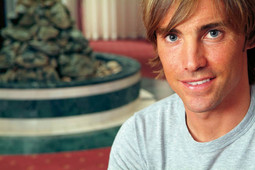 Last Wednesday, Dario Simic (32) became the first ever Croatian footballer to play 100 matches for the national team. This is a fantastic accomplishment in any country, as Simic achieved this by playing for the national team from 1996 to date. Also, he is the only Croatian player to play all the major national team games since Croatia’s independence, meaning three world championships and three European championships. Alongside his exceptional national team successes, Simic has had an equally successful club career. He played for Zagreb’s Dinamo until 1998 and the World Championships, when he signed on with Italy’s Inter. In 2002, he transferred from Inter to Milan. The following season, Milan took the Champion’s League trophy. After this however, due in part to an injury and in part to the large competition among players, he slowly began to play less. For that reason, he signed a new contract with Monaco at the start of this summer.
Last Wednesday, Dario Simic (32) became the first ever Croatian footballer to play 100 matches for the national team. This is a fantastic accomplishment in any country, as Simic achieved this by playing for the national team from 1996 to date. Also, he is the only Croatian player to play all the major national team games since Croatia’s independence, meaning three world championships and three European championships. Alongside his exceptional national team successes, Simic has had an equally successful club career. He played for Zagreb’s Dinamo until 1998 and the World Championships, when he signed on with Italy’s Inter. In 2002, he transferred from Inter to Milan. The following season, Milan took the Champion’s League trophy. After this however, due in part to an injury and in part to the large competition among players, he slowly began to play less. For that reason, he signed a new contract with Monaco at the start of this summer.
His long-standing career success is also due to his quiet family life, with wife Jelena (29) and their three children: Roko (5), Viktor (3) and Nikolas (1). Simic is also one of the rare Croatian athletes to invest the money earned playing professional sports into a private business while still active in sport. Four years ago, he began production of the bottled water Aquaviva, later he invested in Karlovacka Bank and purchased an old house on Zagreb’s historical Tkalciceva St., which he plans to renovate and turn into a lounge bar.
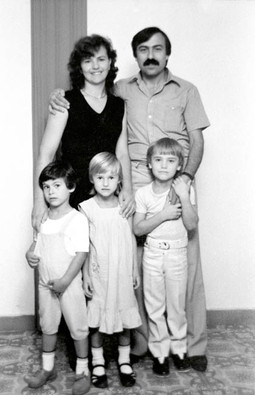 MIRO AND MATIJA SIMIC with children Josip, Mihael and Dario in the early 1980s NACIONAL: Did you ever think or plan to play 100 matches for the national team?
MIRO AND MATIJA SIMIC with children Josip, Mihael and Dario in the early 1980s NACIONAL: Did you ever think or plan to play 100 matches for the national team?
- I won’t be dishonest and say that I didn’t think about it. When I got to 70 or 80 games played, I began thinking about 100. I thought about how great it would be to reach 100 games, to play that 100th game. However, I wouldn’t have been unhappy if this didn’t happen. But this was an additional motive for me, one more reason to grit my teeth when it was difficult. My teammates on the national team have been teasing me, saying that they will give me a farewell bouquet of flowers on my 100th game, but I told them that some other players would receive that bouquet before I would. I am very proud to have played 100 games for the national team that means so much to the people of Croatia. As Miroslav Blazevic would say, I have had the honour and the privilege of playing for this national team. When I look back now, it was not easy to play 100 matches, that’s a lot of years in which you need to maintain a level of continuity. I think that was the hardest thing to do.
NACIONAL: When did you start to play football?
- I began to football later, and I was already 12 when I auditioned for Dinamo. Until then I had only played football on the street. But when I was 16, I played my first game in the Dinamo, and my brother Josip and I were the youngest rookies. My entire family has always been a fan of Dinamo. I was born on 12 November, the very next day my father enrolled me in the Dinamo club, and I still have that membership card. Every Sunday, my father, brother and I went to Maksimir Stadium, and I could hardly wait to watch Dinamo play. When I began playing, I saw that I had more talent than the other players, and I quickly became a member of the Yugoslav junior national team, and later the Croatian national team. I was talented, without a doubt. You need to bear in mind that I was a child of this war, that when I was 15 and should have been developing the most, there were constant sirens and blackouts in Zagreb.
NACIONAL: Was your coach Zdravko Jurcic the key person in your career, as you have often mentioned?
- The turning point in my career happened when I met coach Jurcic, who opened my eyes. I realized how a top rate footballer had to think and all the things I needed to pay attention to. I met him when I was 15. My father was an intelligent man, and could draw some conclusions on his own, but without Jurcic, he couldn’t have pulled some of the key moves because he didn’t have the experience and he had never played football. My father and I knew that the hardest thing was to move from the junior to the senior tam. At that time, when I was 15, we juniors played against Dinamo’s B team and lost 6:0, which was a sign that we needed to work harder to get ready for tougher matches. One of our neighbours hooked us up with Jurcic and we began working together. He was an exceptionally smart man, who helped me to make all the right strategic moves, especially in signing my contracts with Dinamo, and later with Inter. He was not my manager, he was first and foremost my coach, but he helped me in all aspects of my game, and most of all in keeping my feet firmly planted on the ground. Even though we develop earlier, we footballers think we know it all at 16 or 17, and that we are the best there is, even though we are playing poorer teams instead of preparing us for what lies ahead. I also made those mistakes. Had I not made them, I would be a better player today, but that’s all in the past now.
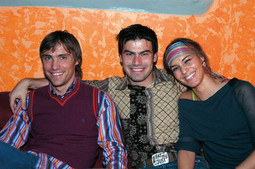 Brother Josip Šimić (right centre) with Dario and his wife Jelena NACIONAL: Proof that you were exceptionally talented came at age 20, when the strongest Italian clubs wanted to sign you, but then Dinamo president Zlatko Canjuga blocked your transfer, thinking that you would be a better player and get a higher price in a year or two.
Brother Josip Šimić (right centre) with Dario and his wife Jelena NACIONAL: Proof that you were exceptionally talented came at age 20, when the strongest Italian clubs wanted to sign you, but then Dinamo president Zlatko Canjuga blocked your transfer, thinking that you would be a better player and get a higher price in a year or two. - There were three Italian clubs interested in me and Silvio Maric: Fiorentina, Udinese and Juventus. I remember that Maric and I were sitting in the room with the Juventus representatives, coach Marcello Lippi who today is Italy’s national team coach, club vice-president Roberto Bettega, director Luciano Moggi and Antonio Giraldo. In 1996, they had won the Champion’s League and I was very impressed when they sat before me. I was just one step from signing with them, but Zdravko Jurcic and Zlatko Canjuga did not let me. Also, President Tudjman wanted to make a strong club out of Dinamo, and so they all did everything they good to keep Maric and I from going to Italy. At that time, my managers were Naletilic and his son, but Zdravko Jurcic had the final word. After that, I spent another two years in Dinamo, played at the World Championships in 1998 where we took third place, we played in the Champion’s League and it turned out for the best. I think that today, young players should take a similar strategy in going abroad.
NACIONAL: You were very popular at age 20, you and Silvio Maric had fan clubs. Were you ever tempted to let football slip and enjoy life instead? When helped you to stay focused strictly on football?
- That was thanks most of all to my family, who raised me to always stand firmly on the group. Later, it was Zdravko Jurcic who kept me under control. I’m not saying I didn’t fly off at all when I was 20, you need to every now and again. I though at 20 that I was already a developed player, that I was the best player, the best looking and that no one could stand in my way. Which is not true. So Jurcic always told us the truth, and oftentimes was even more critical that he realistically needed to be. Many people on the side would slap me on the back and say ‘you’re the best, you’re perfect’, but he would always pay attention to what wasn’t good. What he taught me was very important for my future career, because then I continued to take care of myself. I have remained that way all this time, always thinking about what I could have done to be better, and to stay in the game.
NACIONAL: What do you think about the work of Miroslav Blazevic, the coach who brought you onto the national team in 1996? How did you experience his need for constant media attention?
- Blazevic had his specific style of leading the national team, and he was a great psychologist. He knew how to get the most out of each player, and tactically, he would force the aggressive backs like Mario Stanic and Robert Jarni so that the team always played aggressively and offensively. As a young player, I didn’t pay too much attention to his media relations. For me, he was an absolute leader, I respected him when he was coach of Dinamo with whom he won the 1982 Yugoslav championships, and I was afraid of him when he was my coach in Dinamo. Sometimes he could scare us young players to death, he was very hard on us.
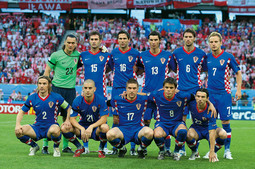 NATIONAL TEAM MATES teased Simic, saying they would give him a farewell bouquet of flowers on his 100th game NACIONAL: Did money change you when you went to Italy in 1998? You signed a multimillion dollar deal with Inter, and there are countless examples of excellent players from eastern Europe who failed miserably in western European clubs.
NATIONAL TEAM MATES teased Simic, saying they would give him a farewell bouquet of flowers on his 100th game NACIONAL: Did money change you when you went to Italy in 1998? You signed a multimillion dollar deal with Inter, and there are countless examples of excellent players from eastern Europe who failed miserably in western European clubs.
- It was amazing for me to sign with Inter, a huge club, but I was 100% focused on succeeding. Just as I worked on the side with Zdravko Jurcic when I was in Dinamo, when I came to Inter, I thought that I would need an extra massage therapist, so I hired one privately, because I needed one. At that time, Inter players included Robert Baggio, Ivan Zamorano, Diego Simeone, Ronaldo. Considering that I had already played in the World Cup in 1998, I wasn’t intimidated by these football greats. I felt a certain degree of respect for them, but I didn’t show any intimidation at training.
NACIONAL: At that time, Inter looked like a club under a bad spell. Massive money was invested, stars brought into the line-up, but there was no success.
- That’s true. The players kept changing, there were all kinds of players, not only stars, so that in two years time, I became captain of Inter. At one time, we had good results under coach Marcello Lippi, one of the best coaches I’ve worked with. True, at that time, Ronaldo and Christiano Vieri were playing for Inter, but they played together very rarely. We finished the season in fourth place, the referees cheated us because they favoured Juventus, which later turned out to be true and it was proven that Juventus had been bribing the referees. With so many well known players in Inter, there has to be a strong management that sets the rules. The right management hires the right coaches and right players. However, while in Milan the leader of the club was well known, and there were always the local players like Maldini and Costacurte, that was not the case in Inter. We never knew who the boss was, there were numerous battles, we didn’t know if the coach or the club president made the decisions, it was all a mess. Roberto Baggio was a positive figure in my opinion, while Christiano Vieri could be very rude to his fellow teammates. Vieri is an excellent player, but he did not conduct himself very well with the weaker teammates.
NACIONAL: Did coming to Milan with your wife help you to stay focused on football, instead of enjoying the night life?
- Very much so, because I had peace of mind and stability. There was no reason for me to wander the streets of Milan. It’s a very dangerous city, and the Milan players are great starts, and it is dangerous to be popular in that city. The footballers are always greeted by countless models, all the world’s top modelling agencies are in Milan and it is no problem at all to enjoy the night life with beautiful women. But I was focused on success, and my family was a great help to me.
NACIONAL: You transferred from Inter to Milan. Did that transfer make things easier for you?
- Absolutely. As soon as my manager Predrag Naletilic said that it was a possibility, I accepted without giving it a second thought. Just before the transfer, I was injured, I wasn’t playing, but the people in Milan thought that I could function well in their team. Milan immediately won the Champion’s League, and I got to play in that league again for the first time since Dinamo. That was enough for me. With respect to money, I had a smaller salary at Milan than at Inter, but I signed a contract for a longer period of time. I didn’t fare better financially, but I did as a player. Milan was a bigger club, and this was great recognition for me.
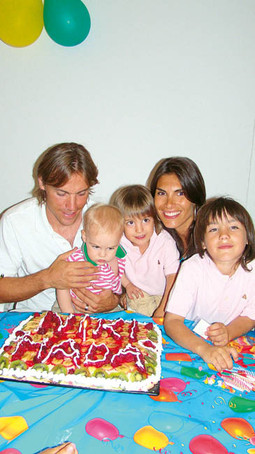 SIMIC FAMILY Dario and Jelena Simic with their sons Nikolas, Viktor and Roko NACIONAL: What has been happening between you and the Milan management in the past year?
SIMIC FAMILY Dario and Jelena Simic with their sons Nikolas, Viktor and Roko NACIONAL: What has been happening between you and the Milan management in the past year?
- It’s no secret that I have wanted to leave Milan at the end of every season in the past few years. I was invited to Everton twice and to Fiorentina twice, but at the end of the season, Milan would tell me ‘Dario, we want you to stay, we’re counting on you,’ which was flattering. I was very tied to both the club and the city, and so it was hard for me to replace Milan with Liverpool, which is a depressing city. Then, two years ago, the club moved me from right back, which is not my position, to stopper. I played 34 games, and played very well. Milan won the Champion’s League where I played six or seven games. This was further motive for me, I was happy at the end of that season, because I was playing my position again. However, at the start of last season, all the defensive players were healthy and playing, and I wasn’t, and it became more difficult for me. Regardless of that, I played well with the national team, and I receive new offers, including one from Juventus. At that time, Milan told me, ‘Dario, we will extend your contract for another year, and we’ll increase your salary, to prove to you that we need you. Maldini is ending his career in June, you are one of our top four stoppers, and you’ll get all the games you need’. Again, I thought about not moving, after 10 years of living in Milan. I even liked not playing every game, because that can be really hard on you. But in June, Maldini decided to continue playing, and so Milan agreed to let me go to Monaco. It wasn’t a problem to find a club, the problem was that I’m 33 years old, I haven’t played in a year and everyone is asking what is wrong with me. But I had faith, and only now, after having transferred to Monaco and I can look back at everything I’d been through, all the moments of playing, not playing and proving myself. Psychologically, it was very difficult.
NACIONAL: You are a religious man. Many people who didn’t know that were very surprised this summer to read that you had taken your friends to Lourdes.
- It was my faith that helped me through some of my toughest moments. People get worn down, and when you use up all your strength, then you need to refresh it. If it is not refreshes, then you fall hard, and begin to try to resolve your problems in alcohol and drugs. I felt as though my faith was helping me, and helping to restore my strength, it made it much easier to handle my problems and I just felt that that was the answer. I felt that our God is a living God, that He can help in every situation if we just open up to Him. I wanted to give my friends a gift, on the occasion of the 150th anniversary of Lourdes. The Pope promised the abolition of sin to all of those who take that path. I think that the greatest gift you can give to someone is to feel the faith and strength that will help you in your life. Everyone has a talent, and faith helps all talent to crystallize. That was the greatest gift.
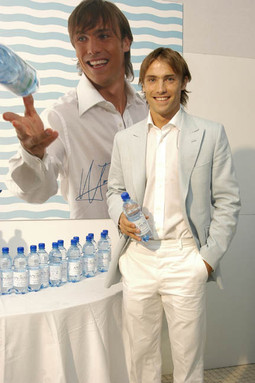 AQUAVIVA Bottled water is just one of Simic’s businesses NACIONAL: How will moving to Monaco affect your family, considering that you have lived in Milan for the past decade?
AQUAVIVA Bottled water is just one of Simic’s businesses NACIONAL: How will moving to Monaco affect your family, considering that you have lived in Milan for the past decade?
- It has always been so difficult for me to imagine life in a city other than Milan. I was even a little afraid of making the move, and in getting settled in a new club after not playing in Milan for so long. But I was calm, I could have stayed in Milan considering that two stoppers were injured. I didn’t want to go to Galatasaray in Turkey, even though they offered a better contract than Monaco, but that wasn’t so important to me. I respect Galatasaray, they are a great club, but that’s not for me. When I arrived in Monaco, I knew that I had made the right decision. Of course, I will have to prove myself, but I felt relieved when I went to training. Of course, my wife and I make all our decisions together, and she was even more tied to Milan than I was. I was in quarantine four out of seven days of the week, and she was in Milan seven out of seven days. She had more friends than I did and making the move was hard for her. I hope that she will grow to love Monaco as I have. As soon as I arrived in Monaco, I forgot all about Milan.
NACIONAL: Did you sign with Monaco so that you would have the opportunity to play at the 2010 World Championships in South Africa?
- We’ll see how the situation with the national team will unfold. The team has given me so much, as I have given so much to the team. I have a great deal of respect for Slaven Bilic, as he does for me. We have an amazing relationship.
Brat na čelu Aquavive'My brother Josip ended his football career due to two failed hip operations and he is now at the head of Aquaviva. He takes care of the business. I’m happy for him, because he does a great job, and I’m happy because I don’t have to think about it. Investing in Karlovacka Bank was a good move. The building in Tkalciceva Street is progressing, we have all the building permits and construction will be completed on 1 March next year,’ commented Dario Simic about his business dealings.
Latest news
-
28.10.2010. / 14:15
'A profitable INA is in everyone's interest'
-
28.10.2010. / 09:38
Sanader’s eight fear SDP — Won’t bring down Government
-
21.10.2010. / 15:02
Interior Ministry turned a blind eye on Pukanic assassination
-
20.10.2010. / 09:34
Barisic could bankrupt HDZ



